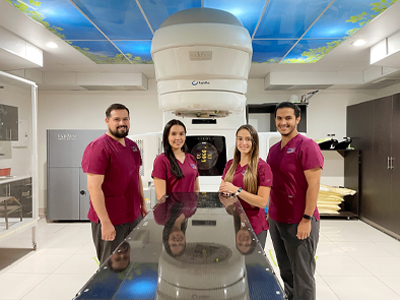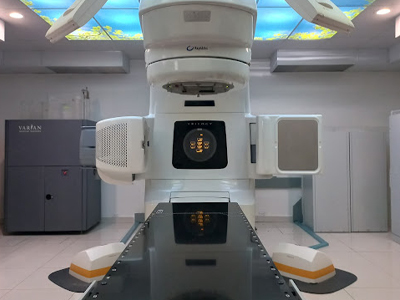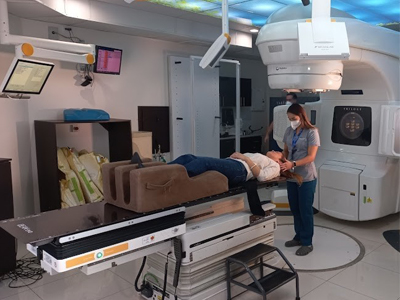Guía para el Paciente

El personal de Radioterapia Siglo XXI le da la bienvenida y reafirma el compromiso de velar por la atención oportuna de su enfermedad» ya luego continua lo demás.
Nuestros profesionales y en general el equipo de trabajo, nos tomamos el tiempo para escucharlo, explicarle cada proceso y entendemos muy bien el valor de la empatía y el respeto por las creencias religiosas y políticas de cada quien.
Esperamos que durante su tratamiento, sienta nuestro apoyo y podamos contribuir a que su experiencia sea lo más agradable posible. A continuación le presentamos esta pequeña Guía, con el objetivo primordial que conozca en detalle en que consiste el tratamiento radiante en cada una de sus etapas y los especialistas que intervienen en las mismas.
Tenga la certeza que ha venido al lugar correcto y que tendrá el mejor tratamiento posible, así como un grupo de personas que estarán en la mejor disposición de contribuir a su bienestar.
Información de Interés
En la primera cita, el oncólogo radioterapeuta evaluará tus antecedentes clínicos y elaborará la Historia Clínica, teniendo en cuenta toda la información que proporciones de los médicos referentes.
En ocasiones será necesario repetir estudios diagnósticos o solicitar otros adicionales.
En esta consulta se te explicará con detalle el tratamiento que vas a recibir, así como el tiempo estimado de duración total (días, semanas, meses), posibles efectos secundarios y el manejo de los mismos.
Una vez finalizada tu cita con el médico, se te asignará el día para realizarte el procedimiento de Tomografía Computarizada (TC), Resonancia Magnética cuando se requiera y Simulación de Tomografía.
La Simulación: es un estudio preparatorio para el tratamiento. Se realiza por medio de un Tomógrafo donde el médico y el radioterapeuta definen exactamente la zona a tratar.
Con todos los datos obtenidos en el simulador y su historia clínica, el radioterapeuta oncólogo y el físico médico definirán el tratamiento más adecuado.
Aplicaciones de la radioterapia: El tratamiento se realizará habitualmente de forma diaria de lunes a viernes y la duración dependerá de cada caso. El horario de tratamiento será el acordado por el paciente y los radioterapeutas encargados de operar el equipo.
Nuestros radioterapeutas son los encargados de colocar al paciente en la mesa de tratamiento diariamente y utilizarán el o los tatuajes que se realizaron en la simulación como guía para la orientación del haz de radiación, además del uso de la tecnología IGRT (Radioterapia Guiada por Imágenes) que permite a través de la tomografía computarizada colocarlo en la posición exacta para irradiar solo la zona definida. El proceso del Tratamiento de Radioterapia se puede dividir en tres etapas:
A. Antes
B. Durante el tratamiento
C. Después del tratamiento
A. ANTES
Un radioterapeuta lo recibirá y lo trasladará al área de Tomografía, donde se le confeccionarán y/o aplicarán los respectivos dispositivos de inmovilización que requiera para su tratamiento.
A continuación, se le realizará una tomografía computarizada en el área a tratar previamente establecida por su médico, esta tomografía le ayudará a planear su tratamiento de la manera más eficiente y precisa.
La tomografía es un procedimiento muy rápido, en la mayoría de los casos no excede más de unos minutos. Es un procedimiento indoloro.
Luego de la tomografía computarizada, el radioterapeuta encargado del tratamiento realizará unos pequeños tatuajes de referencia en su cuerpo o en el dispositivo inmovilizador con una tinta de color semipermanente, que servirá para posicionarlo correctamente en el equipo de tratamiento. Tenga cuidado al bañarse porque las marcas NO deben borrarse hasta que termine su tratamiento. Si comienzan a borrarse, comuníquese con el radioterapeuta para que las vuelva a marcar. Cada día se le colocará de la misma forma en que se realizó la tomografía de planeación inicial.
Con los resultados de la simulación y su historia clínica, el oncólogo radioterapeuta, el físico médico y el dosimetrista analizarán cuánta radiación se necesita, cómo debe administrarse y en cuántas sesiones se aplicará. Este proceso lleva varios días.
“El éxito de la Radioterapia radica en poder reproducir diariamente la posición definida en este primer paso”
B. DURANTE EL TRATAMIENTO
Tiempo de Duración Estimado: 10 a 20 minutos (Excepto el primer día de tratamiento que será de 15 a 25 minutos)
El tratamiento se realizará habitualmente de forma diaria de lunes a viernes. El descanso durante el fin de semana permite que las células normales se recuperen.
La duración del mismo dependerá del criterio del médico tratante, considerando el tamaño y la localización de la lesión, el tipo de tumor, su estado general de salud y cualquier otro tratamiento que esté recibiendo. Todos los tratamientos son diferentes, así que no se sorprenda si ve a otros pacientes con esquemas totalmente diferentes al suyo. Antes de irradiar, el radioterapeuta lo colocará en la misma posición en la que se realizó la tomografía computarizada, se verificará el área a tratar mediante imágenes digitales obtenidas desde la consola de tratamiento (Área de Computadoras)
El equipo se moverá a su alrededor para localizar el lugar o lugares donde se aplicará el tratamiento Durante cada sesión de tratamiento, usted permanece en la habitación de 10 a 20 minutos, pero la dosis de radiación solo dura de 1 a 5 minutos.
Los radioterapeutas abandonan la sala de tratamiento antes de aplicar la radiación, la cual se realiza desde computadoras ubicadas fuera del búnker.
* Aunque se sienta solo dentro del búnker, recuerde que los radioterapeutas pueden verlo y escucharlo todo el tiempo, y también pueden hablarle a través de un altavoz durante su tratamiento de manera continua desde la consola de control.
Rápidamente se familiarizará con su rutina de tratamiento; tenga en cuenta que aunque cada sesión dura aproximadamente de 5 a 10 minutos, usted pasará de 30 a 40 minutos en el Centro Médico entre su llegada y su salida. Nota: Recuerda que durante la extensión de tu tratamiento deberás acudir a citas de control con tu médico tratante con la periodicidad que éste defina.
C. DESPUÉS DEL TRATAMIENTO
Mantén los mismos cuidados, recomendaciones y restricciones que tenías durante tu tratamiento hasta 30 o 60 días después de tu última sesión de radioterapia.
La radiación, utilizada en los niveles adecuados, destruye la capacidad de las células dañadas de crecer y reproducirse.
Este tratamiento de radiación cumple la función de reducir la lesión o de impedir que algunas células que quedaron después de la cirugía vuelvan a crecer.
«TODO ES POSIBLE en la medida que TÚ CREES que es POSIBLE»
Puedes continuar con tu rutina habitual. No te esfuerces. El cuerpo de cada paciente reacciona de forma diferente a la radioterapia, por eso el médico planifica el tratamiento de forma individualizada para cada paciente.
Puede sugerirte que limites ciertas actividades, como el deporte, según convenga. Tendrás que cuidar bien tu cuerpo durante el tratamiento para proteger tu salud y ayudar a que el proceso sea exitoso.
Aquí tienes algunos consejos que debes recordar:
Asegúrate de descansar lo suficiente. Duerme tantas veces como sea necesario. Tu cuerpo necesitará mucha más energía y es posible que te sientas un poco cansado.
Una buena alimentación es fundamental: intenta llevar una dieta equilibrada para evitar perder o ganar peso. La enfermera te indicará la dieta adecuada según tu zona irradiada.
Evita llevar ropa ajustada como fajas o cuellos apretados sobre la zona a tratar. Es mejor llevar ropa que sea cómoda y que puedas lavar o incluso desechar si se mancha con tinta.
Ten mucho cuidado con la piel de la zona a tratar. No utilice jabones, lociones, desodorantes, perfumes, cosméticos, polvos ni ningún otro producto en esta zona sin consultar antes con su médico o enfermera.
No aplique calor ni frío en la zona a tratar. Utilice únicamente agua tibia para lavar la zona, ya que podría lesionarse la piel.
Proteja la zona a tratar del sol, si es posible cúbrase la piel con ropa ligera o póngase un sombrero. Continúe protegiendo su piel del sol con un buen protector solar durante al menos un año después de finalizar la radioterapia.
«No exponga la zona tratada al sol»
Los efectos colaterales que pueden presentarse son diferentes según la zona tratada. Su médico le explicará los que se aplican a su tratamiento en particular.
- Radioterapia: NO ES DOLOROSA.
- NO ERES RADIACTIVA después o durante el tratamiento.
- No eres una amenaza para la salud de tu familia, amigos o mascotas.
- NO PIERDES EL CABELLO, a menos que la irradiación se aplique en el área de la cabeza.
- Si estás EMBARAZADA, crees que puedes estarlo o quedas embarazada durante el tratamiento de radiación debes informarlo inmediatamente.
- Es importante que permanezcas QUIETA durante el corto tiempo de aplicación.
Puedes asistir a tus citas acompañada de una persona, si así lo requieres. Para evitar aglomeraciones en las salas de espera, NO es recomendable asistir con más de 1 acompañante o con niños.
Te rogamos que llegues al Centro Médico 10 minutos antes de la hora indicada; en caso de llegar tarde, ocasionará demoras en el tratamiento de otros pacientes que lleguen a tiempo. En caso de no poder asistir a la cita, deberá notificar a los teléfonos: 2290-3447, 2290-3475, 2290-3481 y solicitar una nueva cita.
Tome únicamente medicamentos prescritos por su médico.
Si tiene alguna duda, consulte a su radioterapeuta, a su enfermera o médico tratante. Ellos son los únicos que pueden asesorarlo sobre su tratamiento, efectos secundarios, cuidados en casa y cualquier otra inquietud médica que pueda tener.
El equipo profesional de este Centro Médico está conformado por Oncólogos Radioterapeutas, Físicos Médicos, Ingenieros, Dosimetristas, Radioterapeutas, Enfermeras y un grupo de apoyo administrativo. Cada uno de ellos cumple un rol durante el transcurso de su tratamiento, desde la indicación de la cantidad y tipo de radiación, equipo a utilizar, su ubicación diaria en la mesa de tratamiento hasta la logística de atención al cliente. Todos estos profesionales trabajan en conjunto para brindar excelencia a su tratamiento. Al colaborar con ellos, usted puede ayudarlos a lograr mejores resultados.




